Need Technology Partner with Domain Experience?
Hire Ascendix experts. Leverage our experience in real estate, legal, financial, and transportation industries.
We can’t deny that artificial intelligence in real estate is a trend with staying power. Don’t believe us? Check the numbers: only in the first half of 2022, AI real estate startups raised $8 billion, while 70% of all real estate deals included AI startups.
But what is the deal with Generative AI in real estate and how exactly does it differ from AI we all got used to? Can it substitute real estate professionals or is it simply a tool to automate their workflows? We suggest you dive into the article now because we’ve already got the answers.
Artificial intelligence in real estate is computer systems and machines that perform intelligent activities like image or speech recognition by simulating cognitive processes related to human intelligence like learning, thinking, understanding, and problem-solving.
The AI work is based on so-called ‘neural networks’ – computational models imitating human brain processes where one neuron passes the data to the next one for further analysis. Yeap, you can think of AI as basketball, where the ball is passed from one player to another to finally land in the hoop.
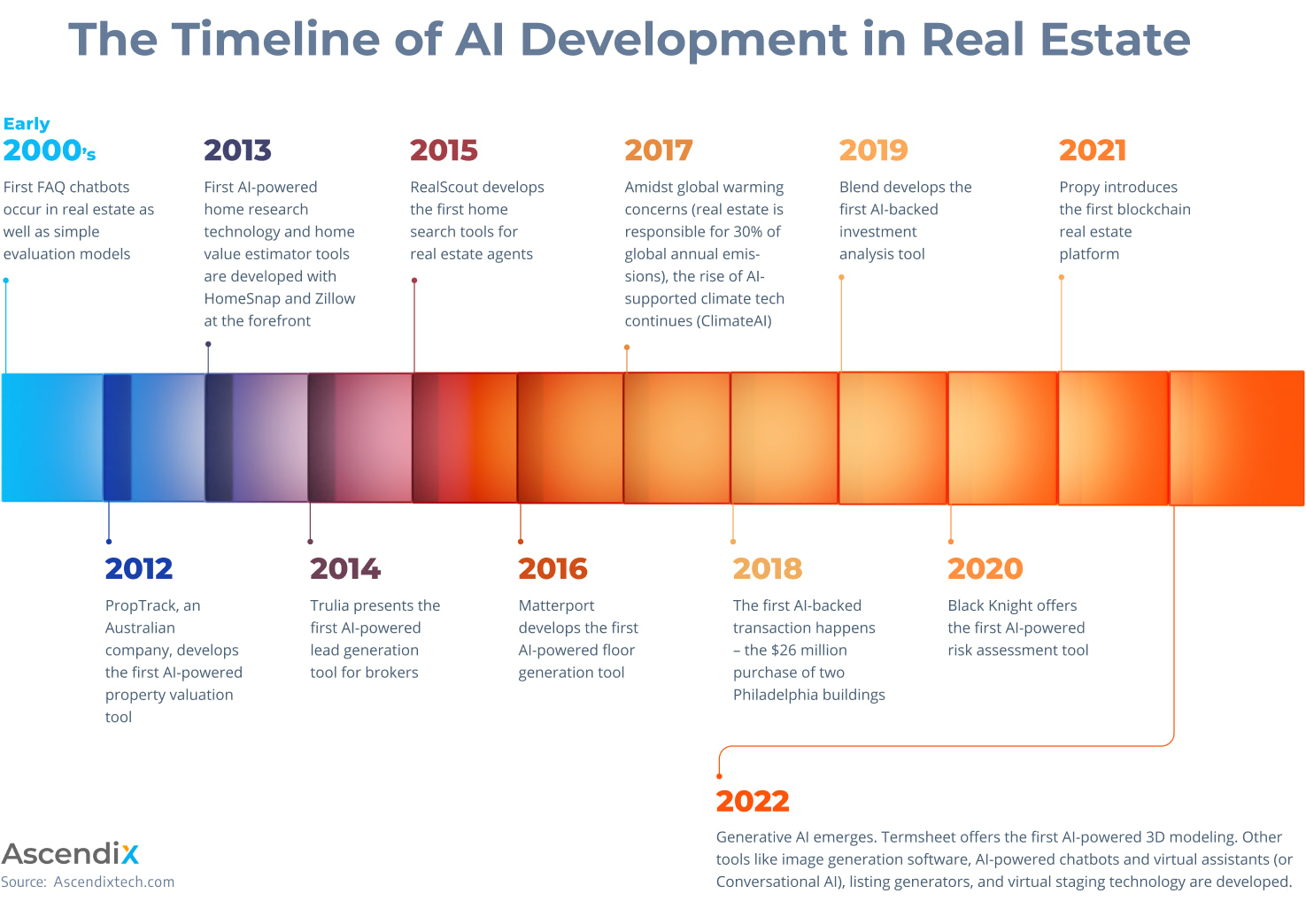
The Timeline of AI Development in Real Estate
Some sources might tell you that AI entered real estate in 2018 when the first AI-backed transaction happened – the $26 million purchase of two Philadelphia buildings. But the truth is that AI in real estate has been longer than we think.
In the early 2000s, AI propelled us into the era of FAQ chatbots (used less often than nowadays, obviously). And the first proptech player known for developing an AI tool in real estate was PropTrack – an Australian company that built an AI-powered property valuation tool in 2012.
A year later, the rise of AI-powered home research software and home value estimator tools began, presented on the market by HomeSnap and Zillow respectively.
But the AI boom didn´t stop there. In 2014, Trulia presented the first AI-powered lead generation tool for brokers, while in 2015, RealScout developed the first home search tools for real estate agents that helped them find homes the most likely to sell fast and bring the highest ROI.
Since 2022, real estate has seen the emergence of generative AI (which we’ll explore in detail later in the article and which is marked by the creation of a 3D modeling tool by Termsheet):
… and Predictive AI:
What should we expect from AI development in the near future? Well, more autonomy and creativity. For instance, a property management tool that makes property-related decisions independently from users, holds communication, processes maintenance requests and financial operations.
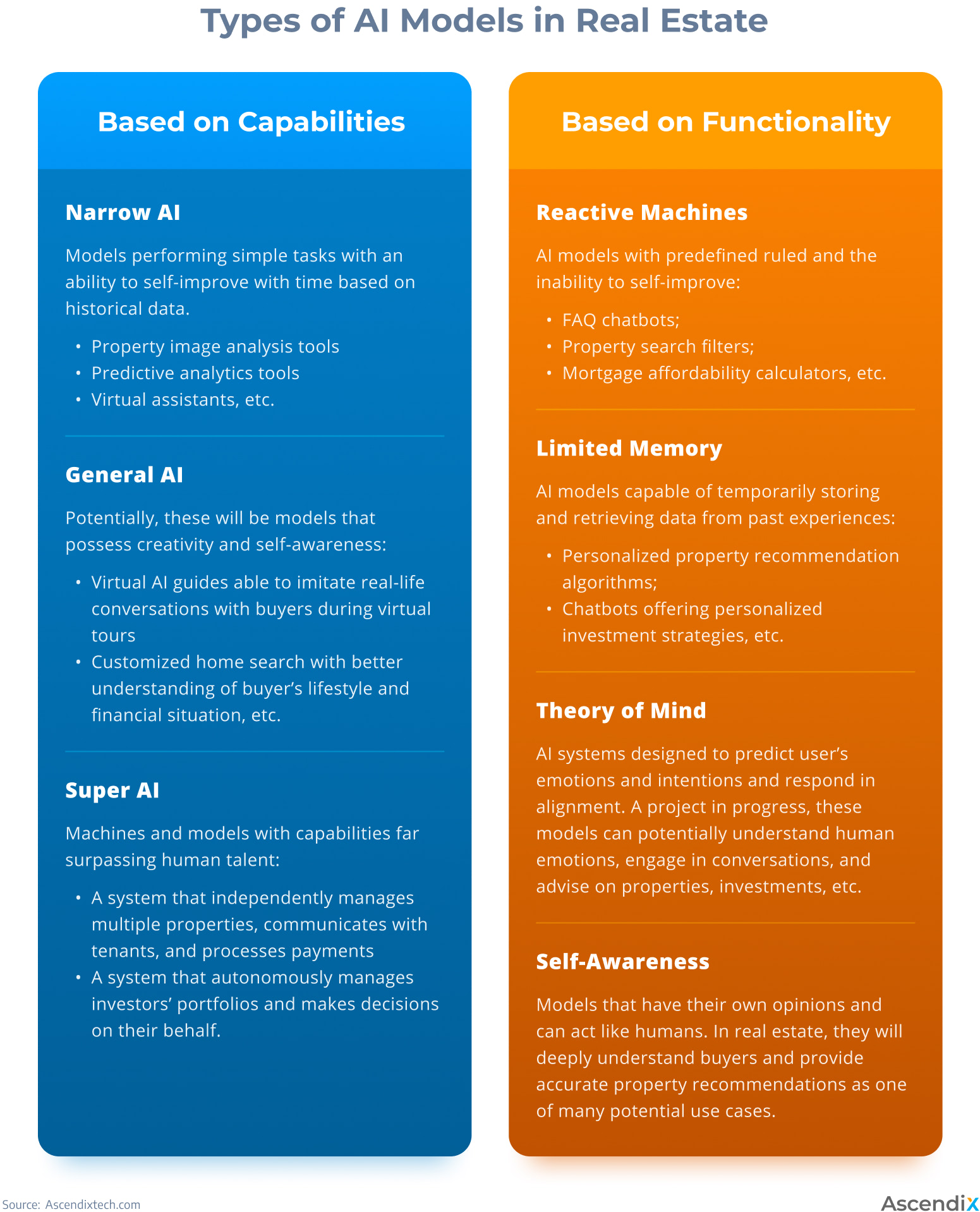
Types of AI Models in Real Estate
We’ve found two classifications of Artificial Intelligence in real estate.
Based on Capabilities:
Most current AI applications in real estate fall into the Narrow AI category, with General AI and Superior AI being a dream to come true.
Based on Functionality:
Hire Ascendix experts. Leverage our experience in real estate, legal, financial, and transportation industries.
AI is a broader concept, as we’ve found earlier, and both Generative AI and Predictive AI are its subcategories.
Generative AI includes models designed to create new images, videos, text, and music based on patterns and data that already exist. If you’re not living under a rock, you might have already heard and probably used ChatGPT – generative AI that creates texts and engages in conversation with users. Later in this article, we’ll talk more about types and examples of Generative AI and how they are applied in real estate.
Predictive AI encompasses models designed to make predictions based on the historical data fed to the system. In real estate, you’ll find AI in tools that predict market trends (especially helpful for investors), property prices, and mortgage affordability.
Since it is Generative AI that is taking the world by storm, let’s talk more about it.
Well, not only in real estate – they’re in other industries that strive for innovation, too. What started as an improvement of neural networks with Long Short-Term Memory Networks in December 1997 by Sepp Hochreiter and Jurgen Schmidhuber soon led to the emergence of various Generative AI vs Predictive AI models in the 2010s.
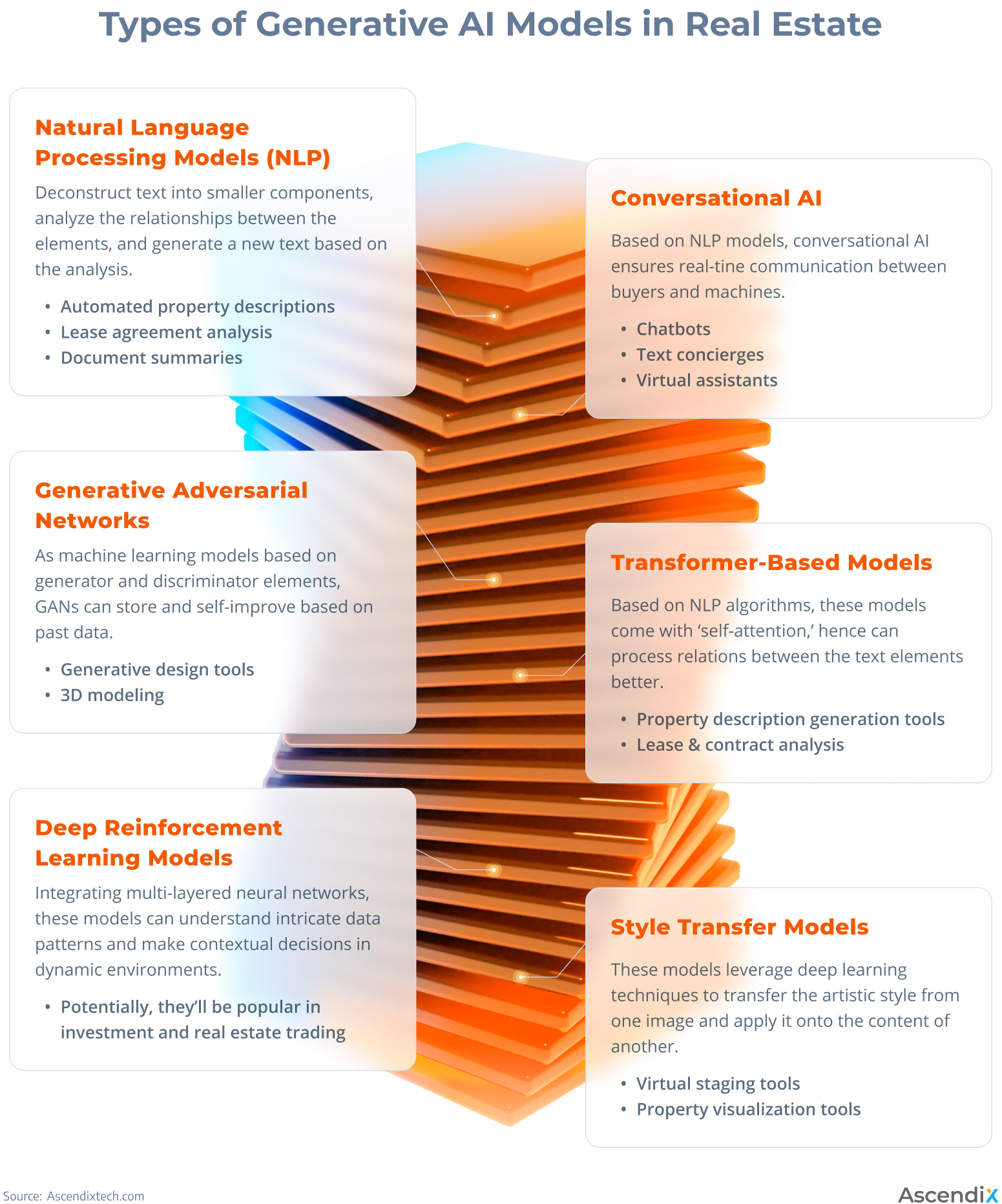
Types of Generative AI Models in Real Estate
Natural Language Processing Models (NLP) break the text into smaller elements like phrases and words, analyze the relationship between these particles in terms of grammar and syntaxis, and generate human-like responses in the end.
Conversational AI, which is a part of Generative AI, is based on NLP and ensures dynamic real-life communication between users and machines. In real estate, the latest examples of Conversational AI in real estate are chatbots (STAN AI), virtual assistants (Diffe.rent), and texting concierges (RoofAI).
Generative Adversarial Networks (GAN) are machine learning models based on two elements – generator and discriminator: the former creates new data, and the latter categorizes it as true or false. You remember that machine learning models can store past data and self-improve, right?
How are they used in real estate? GANs (invented by Ian Goodfellow in June 2014) are used mostly for image generation in architectural design and urban planning. Generative design tools (InteriorAI, Dream Staging AI) and 3D modeling (GANVerse 3D) are based on GAN.
Transformer-Based Models are models that have taken NLP and gone further by adding ‘self-attention’, and due to it, they can assign importance of different levels to words and understand complex contextual relationships. These models were first introduced in 2017 in the article “Attention is All We Need” by Vaswani et al.
Think of ChatGPT. GPT-1 was released in 2018, based on the transformer model and trained on … books. And that was GPT-2, released in 2019, that could generate texts. Compared to its predecessors, GPT-3, as we know it, can generate even more comprehensive texts, translate them, perform calculations, and write code.
How are they used in real estate? The best examples of transformer-based models are property description generation tools (ListingAI) and lease & contract analysis (Doma).
Deep reinforcement learning is where deep learning meets reinforcement. You might remember that deep learning implies multi-layered neural networks recognizing complex data patterns and processing them. Meanwhile, reinforcement learning is when the machine is taught to make contextual decisions in dynamic environments fast.
How are they used in real estate? While deep reinforcement learning is still a terra nova in proptech development, it promises a bright future to real estate, especially in the field of investment and real estate trading where ‘buying’ and ‘selling’ can be reinforcement actions as a part of the model in work.
Style transfer models are based on deep learning technologies and apply the style of one image to the content of another. In the end, the content is still the same but is presented in a different form. Top examples of style transfer models in software are Spline AI, Change Style AI, and Transpic.
How are they used in real estate? Software based on style transfer models can be used in virtual staging, property visualizations, and even virtual tour creation.
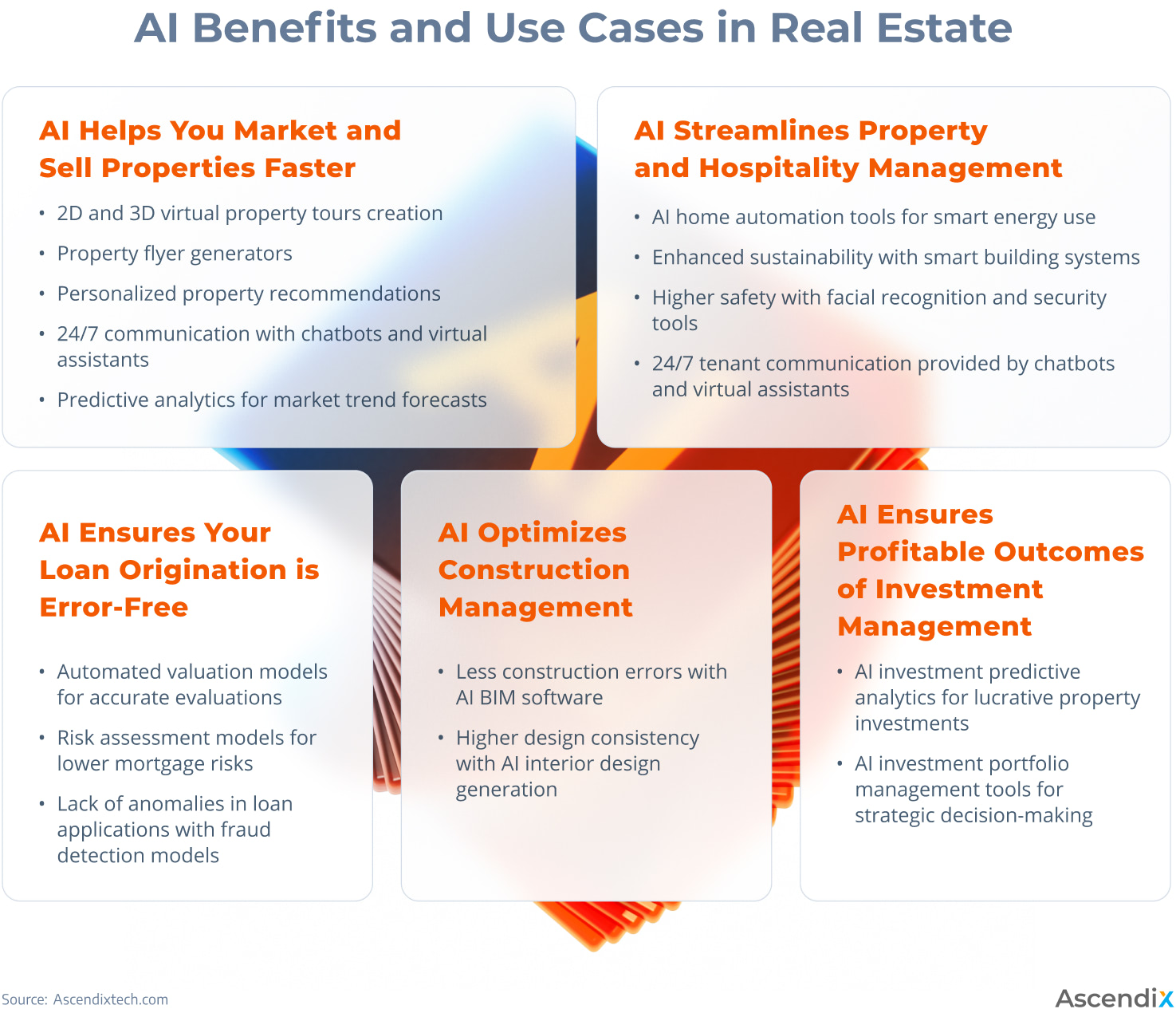
AI Benefits and Use Cases in Real Estate
Both 2D and 3D tools for virtual property tour generation (Matterport, Getfloorplan) offer an immersive experience and reduce the need for potential buyers or renters to schedule a property tour and physically visit it.
Most often, 2D generation tools involve users taking photos of the property and uploading them to the virtual tour generation platform, so the photos can be further properly arranged. Meanwhile, 3D scanners or cameras are often used to create a 3D property tour.
For instance, Getfloorplan helps brokers create visually appealing property tours, simple 2D or colorful 3D plans with a few steps already described above, turning property photos and videos into sales-driven property presentations.
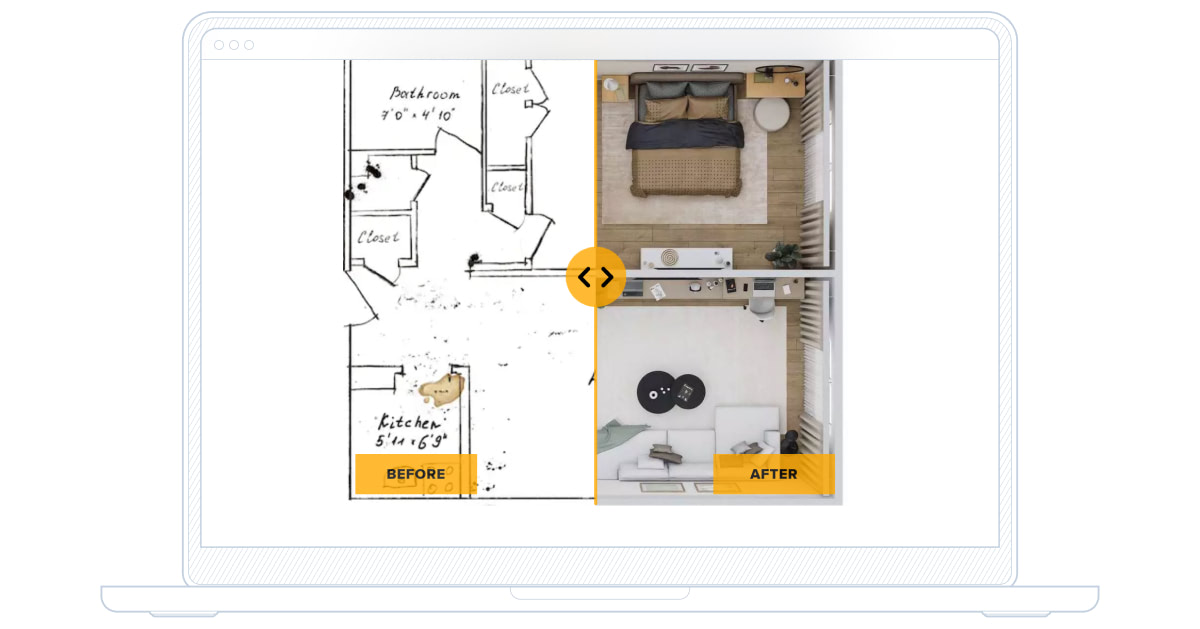
Getfloorplan AI Functionality
How many buyers have you lost simply because your property description was too messy or included details they didn’t need?
First, you feed the property data to the tool, like property size, price, and features. Second, you choose a template for your future property flyer. Further, the generator will apply the style you’ve chosen and integrate property media like photos and links to virtual tours.
A great example of an AI-powered listing generator is ListingAI, a tool that applies NLP models to analyze the property data and create an engaging copy.
It would be even better if a real estate flyer AI would be able to fetch property data (photos, descriptions, size, and other values) right from your CRM or database. That’s exactly what Ascendix can help you with, as we’ve authored our own property flyer generator and can do the same for you.
Digital property marketplaces like Realtor are already using this feature to the fullest. Realtor’s Dream Home Builder matches buyers and renters with their ‘dream’ property by simply allowing users to type in the property description – due to image recognition technology, an image of the property pops on the screen, and the user gets a list of the properties that are on the market and that match their taste.
With personalized property recommendations, customers spend less time searching for properties, and brokers close more deals and faster.
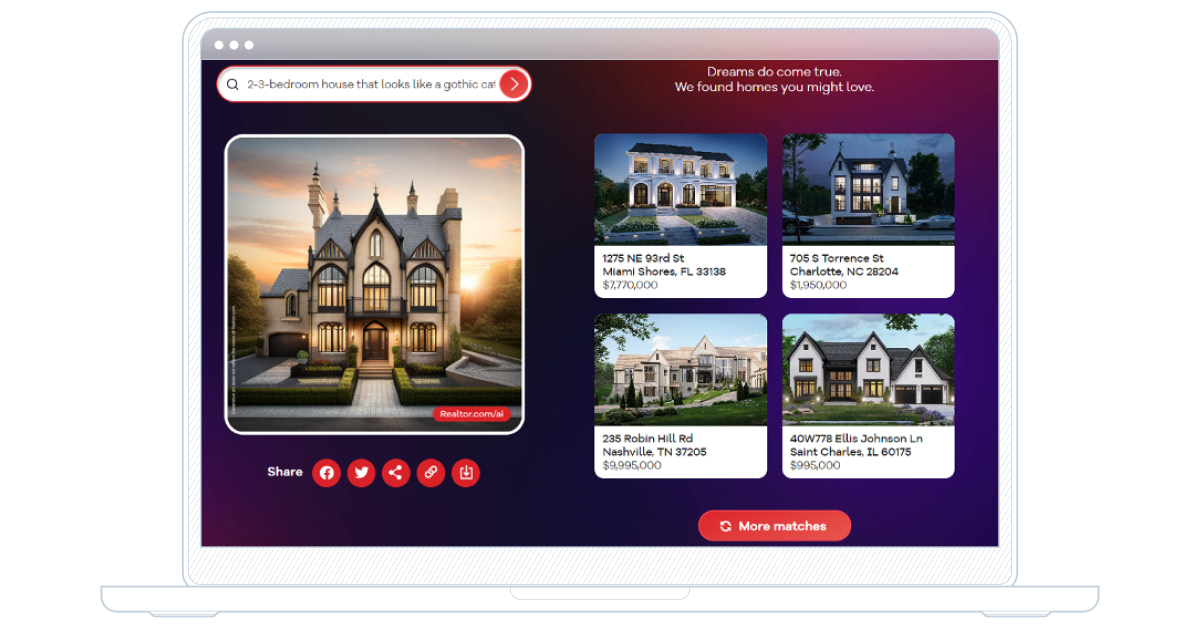
Realtor AI Dream Home Feature
Yeap, Conversational AI in real estate is the best helper when it comes to answering questions 24/7 without the risk of losing a client. They respond to customer inquiries immediately, schedule appointments with real estate agents, and can even assist in property searches.
A great example of an AI-powered chat and textbot for real estate professionals, in this case, property managers, is STAN AI – a tool that addresses tenant inquiries around the clock, streamlines maintenance requests, room booking, and more.

STAN AI Interface
When integrated with Customer Relationship Management (CRM) systems, chatbots, and virtual assistants can ensure no lead falls through the cracks by automatically transferring the lead data to CRMs.
Other AI Chatbots and Assistants: Hyro, Localize, Diffe.rent, RoofAI
In real estate, most predictive analytics tools have been developed to automate construction and investment processes. Nonetheless, tools like Locate AI can also be used by brokers who are interested in finding the next high-performing location or leverage Tenant ChatGPT developed by Particle Space for enhanced team cooperation.
Coming back to advancements in AI for construction and investment: construction specialists can definitely benefit from identifying ‘fruitful’ development sites with Deepblocks or tracking construction progress with Doxel, while investors can optimize their portfolio performance with Kavout or Canoe investment management tools.
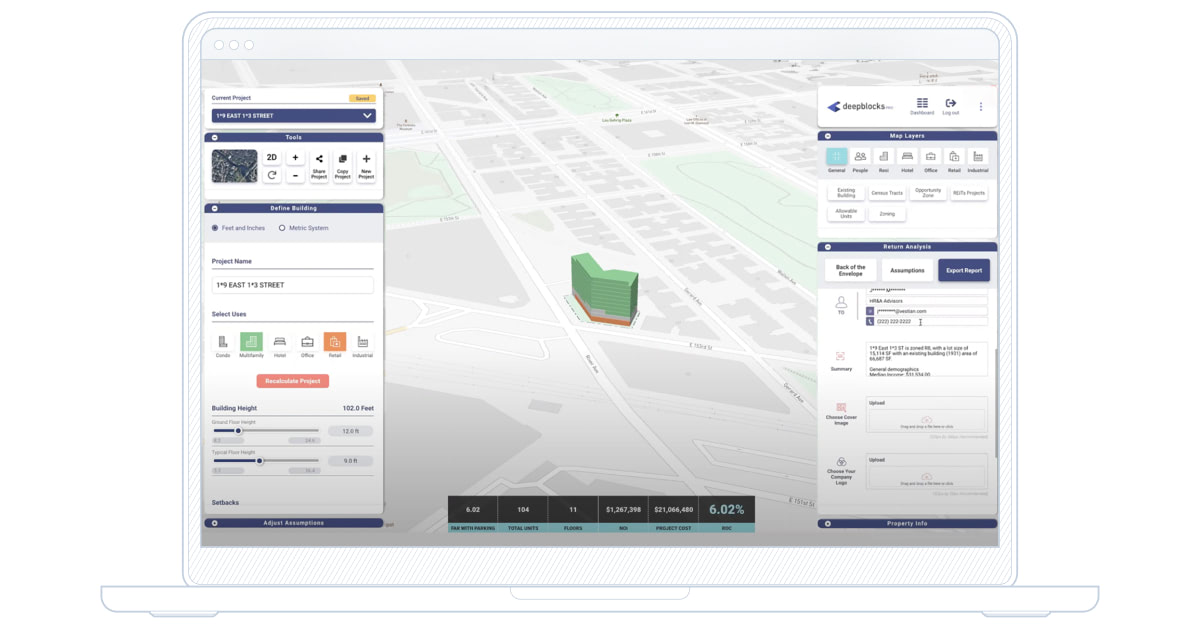
Deepblocks Interface
Automated Valuation Models (AVM) like GeoPhy and Quantarium reduce human error by automating calculations and ensuring valuations are accurate due to simultaneously considering variables like property location, property characteristics, and market trends. Meanwhile, tools like Enodo perform comparable analysis and perform underwriting in minutes.
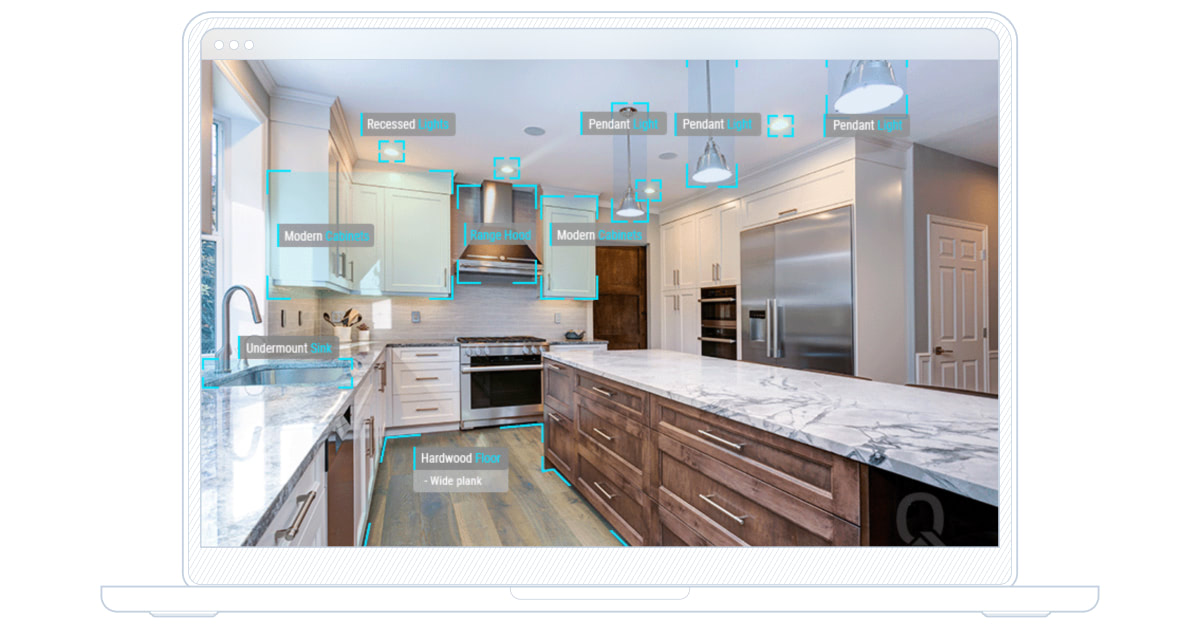
Quantarium AI Feature
Risk assessment tools, just like underwriting software, often integrate with credit bureaus to access the latest client data like borrower’s credit history. When powered with AI, such tools can simulate scenarios like changes in interest rates and their influence on mortgage affordability.
An excellent illustration is CREX Capital – an AI-powered risk assessment platform with Blockchain algorithms that streamlines property financing with automated risk evaluations, property valuation reports, and KPI-driven matching.
AI-powered fraud detection models learn from historical data and can recognize deviation from common application patterns, registering such cases as potential fraud and generally identifying fraudulent activities that a human eye is incapable of detecting. It can also track devices and IP addresses used for sending multiple applications.
One of the latest AI fraud detection software is Ocrolus. The tool’s algorithms automatically classify financial documents, extract and structure data, detect any fraudulent activity, and generally understand the unique cash flow dynamics.
Order a complete checkup of your software project involving a deep analysis of its technical architecture, design, processes and procedures.
AI home automation tools often include virtual assistants (Josh AI), smart security systems (Frigate), and full home control systems (AI Home Solutions). These tools are designed to help users control various aspects like lights or temperature, HVAC systems, home access and security systems, etc.
They are especially useful for landlords and property managers who want to save a buck on energy use without compromising tenant comfort. Tools like BrainboxAI connect to your HVAC system and send real-time commands to reduce emissions while also taking into consideration weather forecasts and historical utility data.
AI-powered solutions like DEXMA and Gridium may also come as separate energy management systems that collect the energy data from sources like utility meters and later analyze it. Other solutions are designed for the management of renewable energy sources like solar panels. For instance, ONYX Insight ais used for the management of wind turbines.
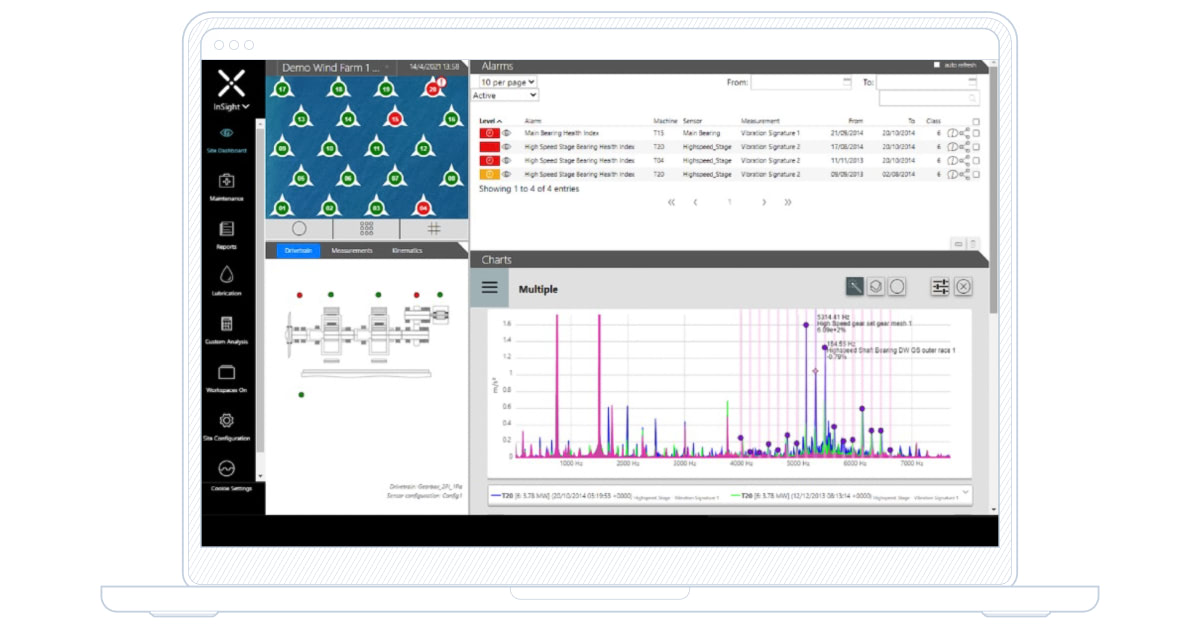
ONYX Insight Interface
Other AI Home Automation Tools: Homebase AI
Other AI Energy Management Software: Clir Renewables, ClimateAI
With regulations like the Sustainable Finance Disclosure Regulation (SFDR) and Corporate Sustainability Reporting Directive (CSRD), businesses take sustainability to heart – 90% of S&P 500 companies publish ESG reports. Hence, no wonder that construction companies are interested in using ESG platforms like Measurabl to measure, manage, and disclose their ESG data with a further intention of acting upon it.
Often coming at the intersection with AI home automation tools, smart building systems (sometimes called ‘green building’ solutions) help users control and monitor energy consumption and minimize energy waste by often integrating with renewable energy sources like solar panels or wind turbines.
Other AI Smart building Solutions and ESG Platforms: BuildingMinds, Greenbuilding Studio
Facial recognition and security tools like Frigate prevent unauthorized access to the property by identifying unique facial features. They send real-time alerts in case of a potential threat (some of them can even compare faces against watchlists of known criminals) and prevent tailgating, making them perfect for large-scale areas where human operators are often less effective.
Unlike property managers and landlords, AI-powered chatbots and virtual assistants never sleep. Yeap, they can stay in touch with your tenants 24/7, answering their requests and sending you real-time alerts in case of emergency. This, in turn, increases tenant satisfaction, hence tenant retention.
For instance, Propic Concierge is an NLP-powered ‘conversation assistant’ that can manage tenant inquiries 24/7, originating from sources like Facebook, email, SMS, etc.
Other AI Software for Property Management: AUtility, Autohost
AI modules in BIM Software help analyze 3D models of buildings for optimal resource allocation, minimizing project delays; identify the optimal construction sequence and potential on-site hazards, reducing the risk of accidents, minimizing waste, and maximizing efficiency.
For instance, Hypar helps users generate, visualize and analyze buildings in a matter of minutes. The tool integrates with Revit, Excel, Dynamo, and Grasshopper.
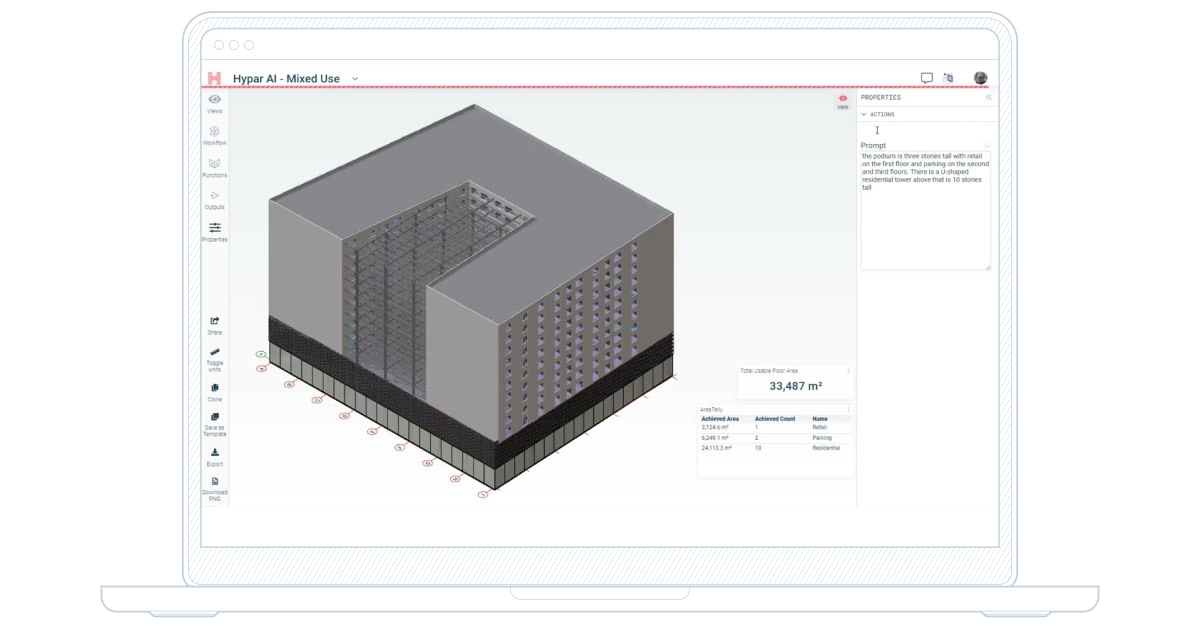
Hypar AI Interface
Other AI BIM Software: BricsCAD
AI interior design generation tools help design and property development teams ensure design consistency by analyzing colors, patterns, textures, and materials. Like Dream Staging AI, one of the latest interior design generators, they often come with a digital library of pre-defined elements and artistic styles to be applied. In this case, AI applications in real estate can offer real-time suggestions regarding design decisions and detect repeated design patterns.
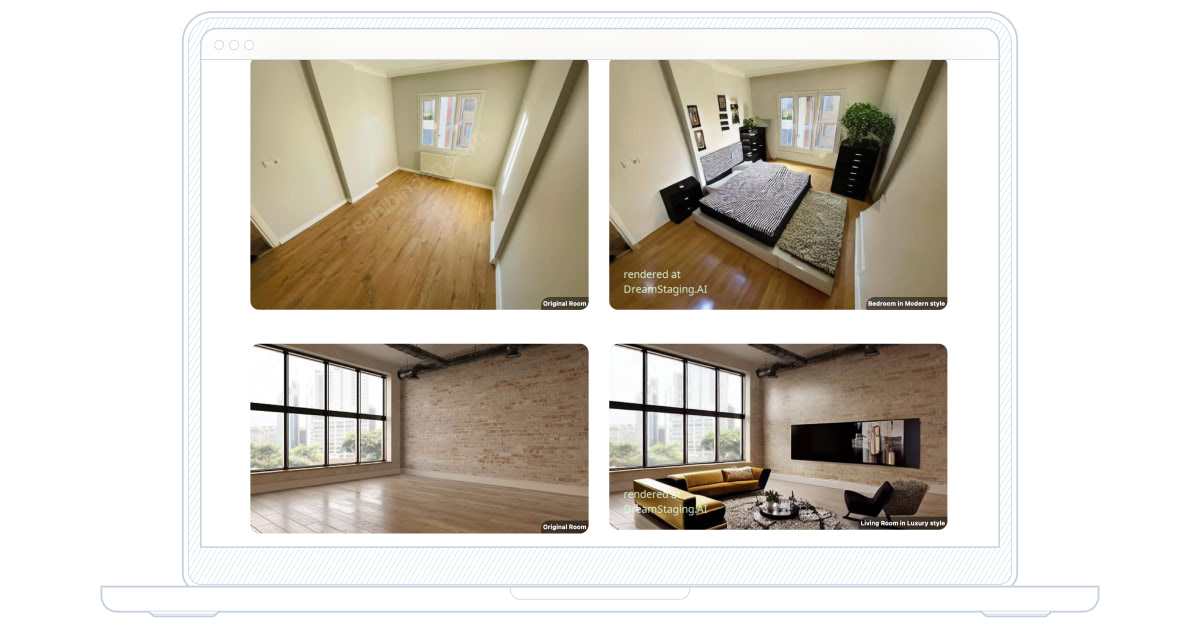
Dream Staging AI
Investment management tools with built-in AI Predictive Analytics like Canoe analyze data like historical property values, economic trends, and rental rates both on the national and local level, forecasting and determining current and future property performance, which leads us to the next point.
With rental income projection and comparable & demand analysis, real estate players can assess their investment risks and potential returns, ensuring safe investments within the dynamic real estate landscape.
AI Investment Portfolio Management Tools: Entera
The company has developed the Redfin ChatGPT plugin in collaboration with OpenAI. The plugin is accessible to all ChatGPT users seeking a new property. Once the plugin is installed and activated on Redfin, users can engage in conversations with the machine, get precise property recommendations, and arrange on-demand property tours.
One of the pioneers of AI advancements in real estate, Reonomy has been leveraging AI since 2013. The company utilizes AI in property matching algorithms, market trend forecasts, and potential investment opportunity searches. With Reonomy AI, customers get accurate property valuations and can successfully evaluate investment risks.
In January 2023, Zillow introduced a user-friendly ‘natural language search feature’ Zillow AI currently available to iOS users. Users input their queries directly into the search bar – no need for additional filters.
Another notable feature is the Neural Zestimate, a machine learning-powered valuation model introduced two years ago. The model accurately forecasts home values by considering a multitude of data points.
Zillow is heavily investing in real estate artificial intelligence, strategically focusing on the development of a single digital ecosystem designed to streamline user real estate experiences.
Rex Job Call introduced by Rex company is Conversational AI for property management that streamlines communication between renters and maintenance teams by transcribing calls and escalating tasks, so the latter can timely register and solve the problem.
In 2018, Trulia introduced a fresh addition known as ‘Trulia Neighborhoods’– an innovation that included 16 million data points to leverage. Now, with ‘Trulia Neighborhoods’, users can evaluate prospective areas through drone footage and photographs.
Later, the company introduced Apache Kafka. By constructing a real-time messaging layer atop Kafka, Trulia has managed to offer its customers a personalized, real-time experience that enhances their engagement with the platform.
Notably, JLL has already successfully integrated artificial intelligence in real estate to optimize building efficiencies, create 3D leasing visualizations, assess sustainability risks, and drive investment leads.
In August 2023, JLL introduced its first GPT model for commercial real estate. Built in-house, the model will be used by over 100 thousand company clients all around the globe. With JLL GPT, users can turn common real estate space utilization and portfolio optimization dashboards into interactive dialogues, resulting in more actionable insights.
Back in 2021, Zumper unveiled PowerLeads AI, a feature designed to examine renters’ activities and forecast their inclination to lease a property. This solution helps real estate agents qualify leads more accurately, identifying renters who are ready to lease immediately.
Recently, the company introduced its unique Zumper ChatGPT plugin. The feature ensures a smooth search experience for renters, linking them with Zumper listings that precisely match their property search criteria.
Houzz, a platform that connects homeowners with real estate professionals for home remodeling projects, leverages real estate artificial intelligence to analyze consumer purchase & browsing history and offer tailored suggestions for products and services. Meanwhile, Houzz Visual Match, another feature, allows you to identify similar products by uploading photos of spaces you find appealing.
In 2021, Compass introduced Video Studio – an AI tool for real estate professionals that simplifies the creation of property tours. Users have to enter the Compass platform, select a video template, and feed the property listing details to the system.
Powered by its image recognition mechanism, the tool detects property features, matches them with images, and generates a complete video presentation at the end.
As a Texas-based proptech software development company, we’ve been closely following the development of artificial intelligence in real estate and asking ourselves how we can help you. And that’s what we’ve found out.
But first, why Ascendix?
How can we help you?
Have more questions? Contact us or book a free call to learn how our expertise can cater to your needs.
AI in real estate encompasses sophisticated algorithms and machine learning models designed to automate processes like property buying and selling, property marketing, underwriting, appraisal, and investment. AI examples are predictive analytics tools, chatbots, AI-driven underwriting, image generation software, etc.
Generative AI vs AI are both AI fields with AI being the broader category that encompasses computer systems and machines that perform intelligent activities traditionally performed by humans; and Generative AI being the subfield of AI that includes models designed to create new images, videos, text, and music based on patterns and data that already exist.
Real estate companies embracing AI in real estate are Compass, Zillow, Trulia, Houzz, Zumper, JLL, Rex, Reonomy, and Redfin. The latest real estate AI startups are CREX Capital, Frigate, Localize, Built AI, and Zuma among many others.
Tania is a fan of technologies and an expert in writing about them. In her content, she shares insights into new trends and proptech solutions in real estate that can help your business thrive while keeping your customers content (pun intended).
Get our fresh posts and news about Ascendix right to your inbox.